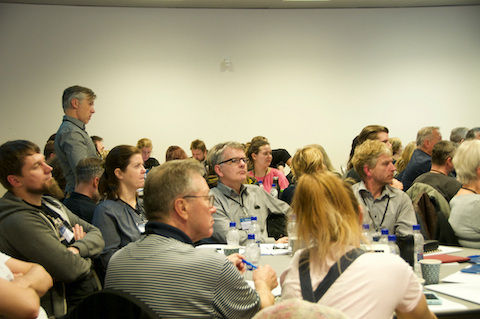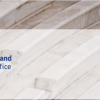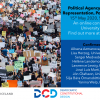
How should the Constitution be amended?
While the procedure is different in each country, constitutional amendments are usually more difficult to achieve than amendments to ordinary legislation. In Iceland, amendments are ratified by a simple parliamentary majority, but the ratification must be done twice for amendments to take effect – before and after general elections. The two-tiered system is designed to reduce the risk of abuse, as an overly easy process could lead to constitutional changes that are unwanted by the general population, although a temporary majority in parliament may want them.
In some countries, a national referendum is required for constitutional amendments. A possible argument for such referendums discussed by participants at the Deliberative Meeting, was that as it is the basic law of society, amendments to the Constitution should be made in consultation and dialogue with the public. A referendum therefore would make the ultimate decision a public, rather than a parliamentary one. Possible arguments against this included that constitutional amendments might be too complex for the direct involvement of the public to be make much sense and could increase the risk of demagoguery. Therefore, so the argument goes, constitutional amendments should be in the hands of elected representatives whose responsibility is clear.
The 2011 Icelandic Constitutional Council – often referenced during the discussion – suggested that after being accepted by the Parliament, constitutional amendments should be put to a referendum for approval or rejection. However, if a supermajority (5/6) in the Parliament had reached a consensus, the referendum could be cancelled, and the amendments would nonetheless become law.
Participants were presented with four ideas for amendments to the constitution. First, Constitutional amendments should always be approved in a referendum. Second, the Constitution should continue to be amended by a simple majority of two consecutive parliaments. Third, a supermajority in Parliament (5/6) should be able to amend the Constitution in a single vote (a referendum would still be required for amendments supported by a smaller majority). Fourth, an increased majority in parliament (2/3) should be enough to amend the Constitution.
Topic 1: A constitution should change – but not too easily
After the discussion, a large majority of participants (82%) agreed that amendments to the Constitution should always be approved in a national referendum. However many participants also continued to believe that the current system was sufficient: 59% supported the view that the Constitution should continue to be amended by a simple majority of two consecutive parliaments. After the two days of discussion, the proportion of participants who agreed that an increased parliamentary majority (2/3) should be able to change the Constitution in a single vote shrank from 19% to 14%. The proportion of participants who felt a supermajority (5/6) should be able to change the Constitution in a single vote also got smaller, changing from 44% to 39%.
After the discussion, almost all participants (96%) agreed that it should not be easy to amend the Constitution. A majority (71%) also felt that it should not be too complicated either, since the Constitution should be seen as a living document, reflecting social changes and developments. A large majority (95%) felt that changes to the Constitution should reflect a broad and continuing consensus in the country.
Topic 2: Reconciling cautionary and idealistic approaches
Participants generally agreed that constitutional amendments shouldn’t be too easy: perhaps difficult, but not too difficult. In other words, participants’ views seemed, at face value, somewhat contradictory. The discussion largely revolved around what a balanced process could look like.
In one group, participants debated whether anything was actually wrong with the current Icelandic Constitution. After the discussion, the group concluded that many necessary provisions were missing. While some participants were relatively pleased with the current Constitution, saying that it included good, traditional virtues, others felt that it was outdated and would need to be changed to better serve modern society. Some participants voiced support to the idea that changes made now would have to remain in force for decades, at least. This evoked a discussion about how “timeless” a constitution could be. Two participants debated the true purpose of a constitution. One said that it should embody the “spirit” of the nation, while the other said that is was simply a stable basis for society’s laws and rules. The group as a whole, including those supportive of the idea of a “living constitution”, sympathized with the cautionary approach of those who argued a constitution should provide a long-term basis for legislation.
Participants frequently raised the question whether the attempt to write a completely new constitution had been the reason that the previous amendment process, resulting in a 2012 national referendum, had failed. Changing the Constitution in in small steps seemed more sensible to some participants. Many pointed out that most previous attempts to amend the Constitution had ultimately not proven successful. In that context, some wondered if contentious issues, including an article creating national ownership of natural resources, were standing in the way.
Participants suggested many possible combinations of procedures to amend the Constitution. Views on the issue seemed to remain diverse, even though some form of public participation was very often seen as a necessary part of any amendment process. Some participants suggested increased use of online decision-making, including on constitutional revisions, while others felt it still carried some security risk to go online with issues of such central importance.
Topic 3: Should (and could) Parliament be ignored?
Many participants, some pointing out the danger that politicians might be motivated by self-interest in their decision-making, discussed how involved the Parliament should be in an amendment process. A few participants expressed the feeling that the current arrangement was somewhat peculiar. They debated how logical it really was for Althingi to amend the Constitution, since it was thereby creating the principles of its own function. Many participants thus felt that public input is necessary. One participant worried that the amendment process is currently in the hands of political parties who might care less for changes than guarding various interests.
One group of participants wondered if the Constitution could possibly be changed without any involvement from the Parliament, and if so, who would be qualified to make those changes. Some participants maintained that the Constitution was the law of the people, so the public should amend it – not the Parliament. Quite a few suggested that Althingi should be able to make minor changes, but that a national referendum was needed for more significant ones.
In one group, a participant asked whether it was necessary for Althingi to be the only party licensed to formally initiate amendment processes. Most of the group thought so. Yet, some worried about the inefficiency of the current two-tiered amendments system. Some participants considered two consecutive parliaments to be inefficient, while others worried that the Parliament would always be likely to delay voting on amendments until the end of term, to avoid dissolution. This would make the process too drawn-out.
Topic 4: Involving the public: dangerous or necessary (or both)?
A point raised by some participants was that since society had seen great changes since the republican Constitution was implemented in 1944, the public should be very involved with amending it. At the conclusion of the meeting, a majority of participants agreed that all amendments to the constitution needed to be decided on in a national referendum. Many said that they saw the Constitution as a social contract. In that regard, many participants argued that the language of the Constitution needed to be accessible, i.e. not too complex, so everyone could understand what is being voted on.
In one group, a moderator asked participants if a referendum should be held even if an overwhelming parliamentary majority reached a consensus. Everybody in the group said yes, it should still be held. In another group, some felt that a referendum should not be necessary if the Parliament more or less reached a consensus. There were also some voices arguing that a referendum shouldn’t take place unless the public demanded it. All in all however, the discussion inclined towards not accepting any system of constitutional amendments without voter participation – even the smallest ones. For example, quite a few participants worried where the line would be drawn between smaller and more significant changes.
While some participants felt that a national referendum needed a minimal participation rate for it to be legitimate, e.g. referencing Brexit, others thought that a majority vote should be enough. Many participants also found it important that results of referendums should always be binding. It should not be an option for the parliament to ignore majority will. Here, many participants spoke of the referendum of 2012.
In quite a few groups, participants expressed an interest in voting on particular clauses, instead of only being able to accept changes to the Constitution as a whole. One participant raised the concern that voting on a “package” of changes could enable politicians to put a “bad” clause next to a “good” clause, thus succeeding in implementing both. Some doubted that the public would be willing to research each issue. Allowing voters to accept amendments as a whole, if they chose to, could be a solution to that problem.
Sources:
The Constitutional Council 2011
Information material sent to participants at the Deliberative Poll
Results from the Deliberative Poll





















